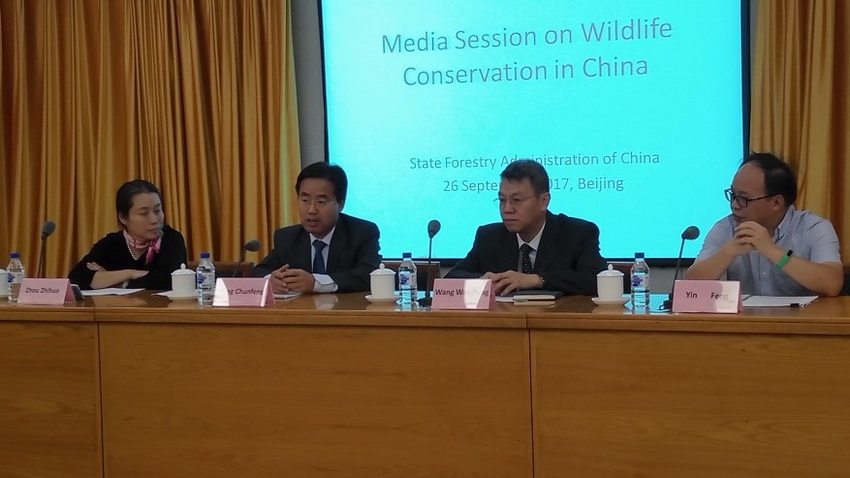


The Chinese Government continues to ensure stricter law enforcement to combat illegal wildlife trade. This comes as a result of China prioritizing wildlife protection in conformity to global call to action on environmental protection.
The establishment of natural reserves started in 1950s. By the end of 2015, there were 2740 Natural Reserves established among of which there were 446 national natural reserves.
The total area of all natural reserves in China has reached 147 million hectares, which covered all kinds of ecosystems and provide effective protection for 85% wild population of wildlife under national key protection.
The Chinese government strict regulations on wildlife conservation have been cascaded unto local government and also nongovernmental organizations level. The government has ensured control of the market to combat illegal wildlife trade, which has received key attention, ensured development of natural reserves and undertaken a thorough public education and international exchange programs on wildlife conservation.
According to laws and regulations of China, activities concerning sale, purchase, commercial use, transportation, personal carrying of protected wildlife or their products should be with permits issued by wildlife authorities.
The laws and regulations of China prescribe severe penalties for those who offend the above legal requirements, fining up to ten times of the actual value of concerned goods, to life imprisonment.
The Deputy Director General (DDG) of Wildlife Conservation and Nature Reserves Management of State Forestry Administration (SFA), addressing African Journalists on combating illegal wildlife trade in China, said law enforcement action saw Forest Police arresting 507 suspects, and local authorities dealing with 47 cases of wildlife conservation crimes.

China’s State Forestry Administration officials addressing African journalists on Sept. 26
Wang Weishang said China is determined to resolutely combat illegal wildlife trade and promote wider international cooperation in the field. Illegal wildlife trade, he added, is an issue existing for long time and almost all over the world, which deserves efforts of all countries and international community to face the challenge.
The Standing Committee of the National People’s Congress approved an additional legal explanation of Criminal Law especially on illegal purchase of wildlife and their products in 2014. This was followed by the adoption of the amendment of the Law for Wildlife Conservation on July 2, 2016, in which a series of requirements including those on consumption of wildlife as foods, trade on interest and advertisement concerning wildlife, etc., have been added.
Some of the key regulations are: Regulations for Conservation of Wild Flora, Regulation for Implementation of Conservation of Territorial Wildlife, Regulation on Management of Implementation and Exportation of Wild Fauna and Flora, Regulation on Management of Nature Reserves, Regulation on Management of Nature Reserves of Forests and Wildlife.
Over 200 endangered species such as Giant Panda, Crested Ibis, Asian Elephant, and Tibet Antelope have increased stably. There are currently 1, 864 Pandas, 422 Crested Ibis, over 300 Asian Elephants, over 200, 000 Tibetan Antelopes, etc.

 Award-winning photos show poverty reduction achievements in NE China's Jilin province
Award-winning photos show poverty reduction achievements in NE China's Jilin province People dance to greet advent of New Year in Ameiqituo Town, Guizhou
People dance to greet advent of New Year in Ameiqituo Town, Guizhou Fire brigade in Shanghai holds group wedding
Fire brigade in Shanghai holds group wedding Tourists enjoy ice sculptures in Datan Town, north China
Tourists enjoy ice sculptures in Datan Town, north China Sunset scenery of Dayan Pagoda in Xi'an
Sunset scenery of Dayan Pagoda in Xi'an Tourists have fun at scenic spot in Nanlong Town, NW China
Tourists have fun at scenic spot in Nanlong Town, NW China Harbin attracts tourists by making best use of ice in winter
Harbin attracts tourists by making best use of ice in winter In pics: FIS Alpine Ski Women's World Cup Slalom
In pics: FIS Alpine Ski Women's World Cup Slalom Black-necked cranes rest at reservoir in Lhunzhub County, Lhasa
Black-necked cranes rest at reservoir in Lhunzhub County, Lhasa China's FAST telescope will be available to foreign scientists in April
China's FAST telescope will be available to foreign scientists in April